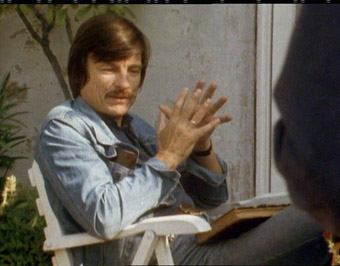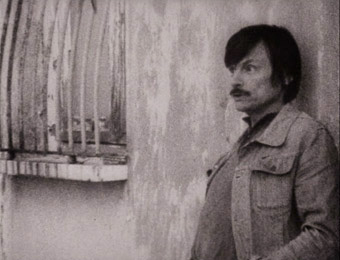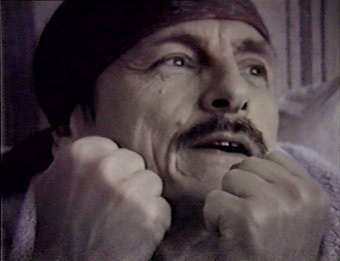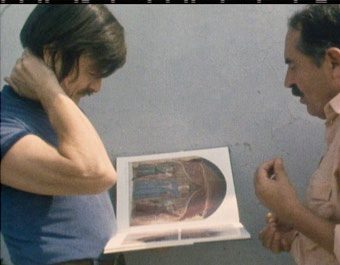|
If
you've never seen an Andrei Tarkovsky film, then I'd make
that your first priority before tackling this 2-disc DVD
set from Artificial Eye. Mind you, unless you've only just
discovered that cinema is your thing then you damned well
should have seen an Andrei Tarkovsky film, or better still
every Andrei Tarkovsky film. A Herculean task this is not,
for despite his deserved reputation of one of the masters
of late 20th century cinema, he only made eleven films, including
his film school work, and most of them are available on
DVD.
My
fascination with Tarkovsky's cinema began back in my own
film school days with my first brain scrambling viewing
of his 1972 Solaris, a work whose unsettling
atmosphere and haunting imagery led me to London to hunt
out his two subsequent films Mirror [Zerkalo] (1975) and Stalker (1979), before later starting work his back catalogue. So well known was
my enthusiasm for these films at the time that in the midst
of some temporal and structural experimentation on the graduation
film I had landed the task of editing, I emerged one afternoon
to find a sign saying "Tarkovsky and Son – editors"
pinned to the editing room door by one of my waggish fellow
students. Oh yeah, I wish.

Hypnotic,
beautifully made and often visually striking, the films
of Andrei Tarkovsky are thematically and structurally complex
enough to invite the sort of detailed analysis that can
send the unwary writer on a disappearing act up their own
behind. He's the kind of director it would be easy to write
pages about and tie yourself in analytical knots in the
process, then find that everything you scribbled down has
already been said by others.
Artificial
Eye's Andrei Tarkovsky Companion contains
three documentary films that are targeted at those
already familiar with Tarkovky's cinema, and while they
could also function as a useful introduction for the adventurous
newcomer, I'd still recommend getting at least one film
under your belt before diving in here. The films also assume
some knowledge of both the director and his filmography,
but that's hardly a problem in the information age. Key
to the appreciation of the films here is that in 1982, after
repeated interference with his work from unsympathetic Soviet
authorities, Tarkovsky left the USSR for Italy, where he
lived in exile almost until his death in a Paris hospital
from lung cancer in 1986, a period that all three documentaries
use as their kicking off point.
And
so to the films themselves.
| Moscow
Ellergy / Moskovskaya elegiya |
|
1982
saw two events that were significant to Soviet Russian cultural
history: the death of Communist Party leader Leonid Brezhnev,
and the permanent departure from soviet shores of its greatest
living filmmaker. While the former was the subject of national
mourning, the latter appears to have gone almost unnoticed.
Five
years later, Russian Ark and The
Sun director Aleksandr Sokurov, to whom Tarkovsky
was both a friend and mentor, assembled this documentary
tribute that focuses on his time in exile and visits some
of the locations that were significant to the director in
years before his departure. Sokurov blends newly shot material
with archive footage and lengthy extracts from Tarkovsky's
final film The Sacrifice, his documentary
self-portrait, Tempo di viaggio [The
Time of Travel], and footage shot by Chris Marker
for his film One Day in the Life of Andrei Arsenevich.
Sokurov himself provides the voice-over, a mixture of the
factual and the personal whose sometimes poetic economy
is especially effective when dealing with Tarkovsky's lung cancer diagnosis.

The
archive and film material is particularly interesting, not
least the organised pomp of Beshniev's state funeral and
intriguing extracts from Marlen Khutsiev's 1963 Ilyich
Gates [Mne dvadtsat let], which
shows a Russian youth scene that looks almost as if it's
strayed into Moscow from an early Godard movie and features
a rare acting role for the then young-looking Tarkovsky.
Although
the only film on disc 1, this is not really one for the
newcomers to Tarkovsky's work, who would be better off giving
disc 2 a spin first. Moscow Elergy focuses
on Tarkovsky the man rather than the films themselves and
walks a non-linear and occasionally abstract path through
the director's final years. Once you find your feet it proves
an increasingly involving and poetic tribute, and while much of the more intriguing footage has been borrowed from
the other two films in this set, its incorporation into
Sokurov's vision inevitably changes how you view it. It
ends on the poignant and significant image of a tree planted
by Tarkovsky earlier in his life and leaves us to supply
the metaphor.
| A
Day in the Life of Andrei Asenevich /
Une journée d'Andrei Arsenevitch |
|
An
episode from the respected French series on cinema and filmmakers,
Cinéma, de notre temps, and directed
by the venerable Chris Marker, this is partly an examination
of Tarkovsky's cinema and exploration of some of its recurring
themes and partly a record of a day's shoot on his final
film, The Sacrifice. The first half plays
almost like an illustrated film lecture but a damned good
one, with the numerous extracts backed by interesting and
perceptive analysis delivered in (English language) spoken
voiceover, focussing in particular on the use of opposing
elements such as fire and water within the film.
The
analysis continues during the on-location footage, which
is engaging precisely because Marker, as he did with his
1985 study of Kurosawa at work, A.K., invites
us to sit back and just watch Tarkovsky work. The effect
is entrancing, his energy, enthusiasm and humour blasting
an effective hole through the clichéd (and inaccurate)
image of the stern-faced Soviet filmmaker, and going a long
way to humanising a man who exists in many minds primarily
as a film legend.

Marker
expands beyond this brief with an engaging and relevant story
about Stalin and the pianist Maria Yudina, and intimate footage
of Tarkovsky in his hospital bed after his first cancer
treatment, re-united with his son Andriosha and consulting
with cinematographer Sven Nykvist and editor Michal Leszczylowski
on the state of play on The Sacrifice edit.
I'd
still recommend seeing at least one Tarkovsky film before
coming to this documentary, but this is then a fine introduction
to his body of work, and a sad tale of a great filmmaker
whose life was cut short in a hospital located in
neither his homeland nor his elected country of exile. For
anyone passionate about Tarkovsky's cinema, this is a must-have.
Oh by the way, Asenevitch is Tarkovsky's middle name.
Directed
by Tarkovsky himself in collaboration with the writer Tonino
Guerra for the Italian TV network RAI, Tempo di
viaggio is essentially a self portrait of the director
and scriptwriter as they scout locations for their upcoming
feature (and Tarkovsky's first in exile), Nostalghia.
Much of this is comprised of conversations that have doubtless
been staged for the carefully composed camera (Tarkovsky
speaks in Russian and Guerra in Italian) but are fascinating
nonetheless. Tarkovsky effectively interviews himself
through questions posed by younger film enthusiasts
on the films and filmmakers that he admires, on his attitude
to commercial and genre movies, his advice to young filmmakers
("not to separate their film from the life they live"),
and his as-yet unrealised projects.
This
is interweaved with genuine but still carefully shot documentary
footage of the location hunt, with Guerra enthusing about
architecture that Tarkovsky rejects because it is "too
beautiful" for their story or because of the locations
are tourist spots. Increasingly, it's the Italian landscape
and countryside itself that hypnotises Tarkovsky and his
camera, which is allowed to linger on the images for longer
than would normally be necessary, seemingly to encourage
us to see and hear them as he does, to appreciate their
captivating simplicity, reflecting his admiration for the
films of Bresson and Antonioni, where so much is suggested
by seemingly little.

There
is a strong sense here of a comfortable unification of art
and life, the small details of which are shown to be as
important as the most grandiose of architectural triumphs.
The location hunt becomes a background detail as Guerra
reads Tarkovsky his poetry and becomes agitated that they
cannot view a white marble floor he has told him about,
and the camera focusses on a street cleaner, a local family
as they cook an al fresco meal, a girl playing with a balloon,
or the steam that rises from the Romanesque pool close to
where the two men are staying.
It
may seem an odd comparison, but I was reminded at times
of Wim Wenders' Lightning Over Water, with
its similarly staged but revealing spontaneity, unhurried
pace and fascination with seemingly inconsequential detail,
something that some might find off-putting but for me helped
give the film a kind of unforced cinematic poetry. A little
self-indulgent perhaps, as any such project is bound to
be, but this is as close to the real Andrei Tarkovsky as
the camera was ever able to get, and that alone makes the
film a rare and precious thing.
All
three films have been transferred in the correct 4:3 ratio,
with image quality varying somewhat even within the films
themselves. Moscow Ellergy probably comes
off worst, with even the newly shot footage some way short
of pristine, although the mixture of extracts and archive
footage is bound to produce variable results. The sequences
borrowed from the other two films in this box set are noticeably
inferior in quality to the originals – both have been stripped
of colour and while extracts of One Day in the Life
have clearly been grabbed from a low band video original,
the condition of the segments from Tempo di viaggio is ropey enough – flicker, water marks, dust spots – to
suggest either a slash print (used in pre-digital days for
rough cut editing) or deliberate degrading of the image
for effect.
A
Day in the Life of Andrei Asenevich is in better
shape but still not without its issues. Shot largely on
video it's free of dusts spots and scratches, although a
number of video damage blips are visible. Colour and contrast
are generally good here, although there is a marked variance
in quality in the included film extracts. A degree of fuzziness
and motion blur has been added by the NTSC to PAL transfer.
Tempo
di viaggio was shot on what looks like 16mm film,
but it appears this transfer was taken from a tape master
– the timecode blips are still visible at the very top of
the screen. Grain is clearly evident throughout but particularly
prominent in low light shots, where the analogue tape and
subsequent digital transfer mutates it into a snowstorm
of coloured dots. At its best this is countered by decent
colour and contrast and a reasonable level of detail. Some
unlit interiors are a little grubby, but this is par for
the 16mm documentary course.
The
sound on all three films is Dolby 2.0 mono, which is serviceably
clear and with no obvious issues. There is a background
hiss on Tempo di viaggio that is particularly
noticeable when all other sound is dropped, although the
mix also includes sections of complete silence where even
the hiss vanishes for short periods. Sound recording is
occasionally at the mercy of the locations, but dialogue
is always audible and the optional English subtitles are
very clear.
Filmographies
for Aleksandr Sokurov, Chris Marker, Tonino Guerra and,
if course, Andrei Tarkovsky.
The
chosen title of this two-disc set from Artificial Eye is
most appropriate, as all three films will be considered
essential companion pieces to the filmography of one of
Russia's and indeed world cinema's most important and revered
talents. All three have their very considerable merits,
despite the borrowing of material by one from the other
two. Where I can't help taking issue with Artificial Eye
is in the pricing. £24.99 might just – and I do mean
just – be justifiable if all three films were in excellent
condition, but they are not, and include one NTSC to PAL transfer
and one that has been mastered from tape rather than the
original film print. Fans are going to want the set anyway,
but I'd look hard for discounts or wait for the sales.
|